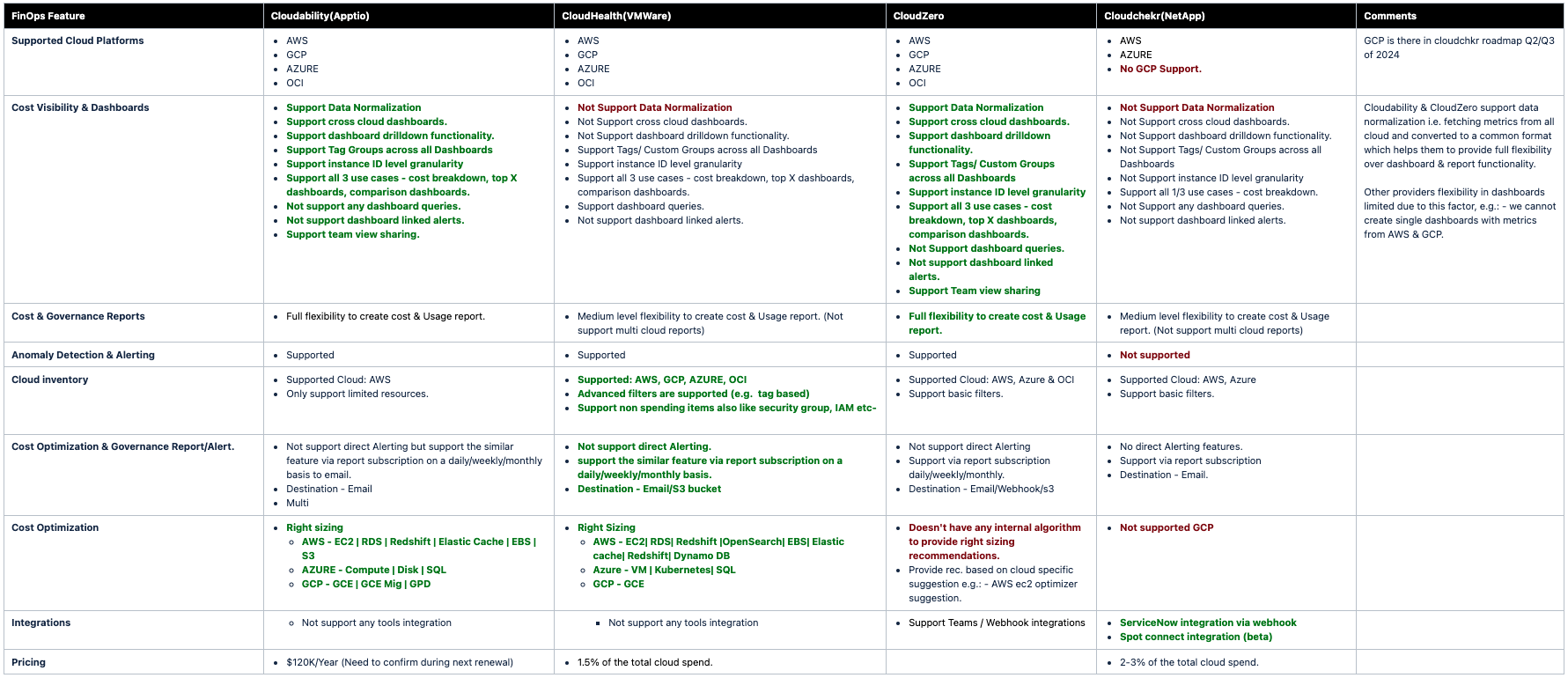Cloud finOps Tools - Do we really need one?
 Midhun K
Midhun K
Let me try to explain the scenario first:
When we work on the cloud, cost is always a nightmare, and it's not easy to optimize and monitor cloud costs, especially when dealing with multiple clouds and numerous accounts and projects. To fill this gap, many companies have emerged to simplify FinOps and cost optimization. Here, we'll dive deep into what the top four finOps tools and understand how they can help us. We'll also compare these FinOps tools and explain why we plan to drop our existing FinOps tool and develop an in-house solutions using available BI tools.
As per my research found that below 4 Finops tools are leading in the market now.
1. Cloudability (Apptio/IBM)
2. CloudHealth (Vmware)
3. CloudZero
4. CloudChecker
Note: There are other tools also out there, but these names pop-up in my research (sorry If I miss any important name here - comment below I'll try to include it)
Note: All these informations are gathered from official website and from the discussion with respective companies tech sales team (Yes that's correct, we scheduled multiple meeting with each of these providers and deep dive to their tools and feature)
If you're just here for the comparison details and don't have time for all my drama then, click the image below to open it in a new window and you have all the info you need. But if you've got a few minutes to spare and enjoy a good read, I’ve added some extra details below. Go ahead, dive in!
Comparison Table:

I'll try to elaborate the pros & cons of each tools below to look at this whole comparisons in another angle.
1. ) Cloudabilty:
What I like:
Multiple Report Formats: New BI reports can be sent in both dashboard view and Excel format, offering flexibility in how data is presented and shared.
Integrated Dashboards and Reports: Dashboards are seamlessly linked with reports, enabling easy drill-down into metrics upto instance granularity.
Business Metrics – We can create our own custom metrics (Only possible via API’s)
Anomaly Alerts are good (Need more integrations)
What I doesn't like:
Alert Customisation Limitations: There are no available options to create alerts based on dashboard thresholds
Limited Alert Destinations: The system lacks integration options with popular tools like ServiceNow, general webhooks, or other third-party services
Optimisation suggestion are limited to the compute & storage resources (Need suggestions for other resources like networking, cloudwatch etc-)
Right sizing suggestions are limited based on last 1 month metrics.
Automation feature limited to the EC2 & RDS schedule only
Anomaly detection - Only available for AWS
2. ) CloudChekr
What I like:
SSO Integration is available.
ServiceNow & SNS Alert Integration support
Spot connect" platform integrations are in beta stage - Once its live it's possible to integrate with many tools & workflows - Read More about Spot Connect
What I doesn't like:
GCP support would live only after Q2/2024
Dashboards tags filtering & Alerts creation not supported.
RI/SP Expiry alerts not possible.
Dashboard drilldown functionality not supported yet (in roadmap)
Anomaly detection is not supported.
Dashboards with multi cloud metrics is not supported.
3.) CloudHealth
Pro's, limitations & Suggestions
Pros:
Support more cloud Providers. (aws,gcp,oci,azue,alibaba,vmware and datacenter)
Governance Automation feature which covers almost all common use cases & also support lambda invocation as action so we can extent the actions to any requirements.
Resource Inventory support almost all resources (includes non-cost resource also like security group, users etc-)
Report subscription - Reports can deliver to S3 bucket in daily, weekly and monthly intervals (We can build automation using upload events)
Limitation:
Unable to support dashboard/report with multi cloud metrics (e.g.: - Dashboard to show combined cloud cost of APAC storefront across AWS + GCP)
Dashboard filters are very limited.
No ServiceNow integrations
Evaluation period for right sizing suggestion is limited to a maximum of 30 days.
No Drilldown option in dashboards there is no direct link from dashboards to the reports.
Optimisation suggestions are limited to the compute & storage resources (Need suggestions for other resources like networking, CloudWatch etc-)
4) CloudZero:
Pro's, limitations & Suggestions
Pros:
Group By feature is there, let's you present the data wrt feature, product, account, tags etc.
Displays the % change in cost w.r.t. to previous month. ( many filters allowed )
Even if our tagging is not perfect, Cloudzero increases our tagging coverage by 20-40% without having proper tagging across our resources.
Supports anomaly detection via slack, email, MS teams.
They also send weekly and monthly notifications about notable cost changes.
Organized resources without proper tagging, shared resources, kuberneetes, cloud provider.
Clarity on the cost allocation & usage of shared resources.
Limitations:
Lesser filter options in the dashboard in case of managing resources from multi cloud vendors.
The creation of custom reports is a bit complex.
Less control over tagging the resources via CloudZero.
Less flexibility with setting up alerts, limited to adding only one email/channel and doesn't allow to setup custom alerts.
Okay, now that we have completed the comparison, these tools offer many features. However, based on our one-year experience with a comprehensive FinOps and cost optimization project, we have decided not to renew our existing FinOps tool, which costs around 5% of our entire cloud expenditure (trust me, its huge, we could set up a 10-member FinOps team with that amount). We decided to pause the subscription, list down the top must-have features, and build an in-house solution using available BI tools like Quicksight and Looker. we'll also leverage the fully customisable ServiceNow. I'll follow up with another post after the project is completed. Stay tuned.....
Thanks for reading:
📚 "Stay in the know! Subscribe to the blog for the latest insights on tech trends, Site Reliability engineering , DevOps and Cloud strategies, and more. 📚#StayTuned
- Site Reliability.in
Subscribe to my newsletter
Read articles from Midhun K directly inside your inbox. Subscribe to the newsletter, and don't miss out.
Written by

Midhun K
Midhun K
I'm Just a Linux Guy!! 🐧 Join me for random posts about Site Reliability Engineering & Related technologies. 👨🏻💻